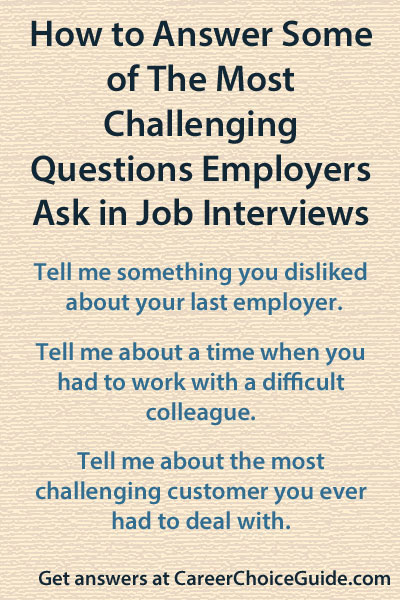Difficult Interview Questions and How to Answer Them
The most difficult interview questions to answer for most people are ones that ask you to tell the employer about a specific negative or challenging situation you have dealt with at work.
Tough job interview questions like:
- Tell me about a time when you had to work with a difficult colleague
- Tell me something you didn't like about your last employer
- Describe a time you had to deal with a difficult customer and how you handled the situation
often trip up job seekers.
Negative Behavioral Based Interview Questions
Questions like the ones above are difficult because:
- they are asking you to describe a specific situation
- and they are asking about something negative
Difficult job interview questions ask you to describe a specific situation
Job interview questions that ask you to tell a story about something you experienced at work are called behavioral (or behavior based) interview questions. Behavioral interview questions are both effective and tough because they are so specific.
Employers don't want to hear generalizations when they ask a behavior based interview question. They are looking for a specific example, and it can be tough to come up with impressive examples on the spot, particularly if you're already nervous.
Tough job interview questions ask you to describe negative experiences at work
Tell me about a time you had to deal with a difficult coworker / boss / customer.
The second reason why theses questions are so hard to answer effectively if you're not prepared, is they require you to talk about something negative that you dealt with on the job.
Negative questions frequently lure people into saying all sorts of damaging things that completely take them out of the running for the job. It's the same reason employers ask you to tell them about your greatest weaknesses.
Don't Panic!
These questions are incredibly tough to answer if you're not prepared. But if you're ready with a few simple strategies, it is easy to turn these difficult interview questions around to prove you're an effective problem solver who can handle challenging situations.
To make sure you're prepared the next time you're asked a tough behavior based question, we're going to look at:
- some insight into what employers are looking for when they ask these questions
- 5 things you should never say when asked how you handled a difficult boss, coworker, or customer
- a simple formula for answering behavioral questions
- an example answer that shows the formula in action
Very Difficult Interview Questions Employers Like to Ask
Employers want to know how you will handle the most challenging aspects of the job. One way they often try to gather that information is by asking you to describe a time when you had to deal with a difficult:
- customer or client
- employer or
- co-worker

There are other challenges an employer might ask about, but the examples above are quite common.
In fact, these questions are so common, you should always be prepared to describe how you dealt with a challenging customer, coworker, and boss any time you go to a job interview. There's an excellent chance you'll need to answer at least one of them in an interview.
The specific way the employer phrases the question may vary from interview to interview.
Employers may phrase difficult interview questions in a way that is more specific to your line of work.
For example, if you worked in social services, the question, "Tell me about a time you had to deal with a difficult client." may become, "Tell me about a time when you worked with a client who was at risk for suicide." It is, in essence, the same question, but it is more specific to that particular field of work.
Don't be confused by different wording. The essential questions and the best strategy for answering them remain the same.
5 Things You Should Never Say When Answering Tough Behavior Based Questions
Before we dive into what you should say to answer difficult interview questions, here are 5 things you should never talk about:
1. You don't have to talk about the most horrible, obnoxious person you've ever worked with.
When asked how you dealt with a difficult boss, customer, or colleague, most people's minds immediately jump to the most annoying, horrible person they have encountered at work.
You don't have to talk about that person in a job interview.
You do need to tell the employer about a challenging person or situation you handled well. You do not have to tell the employer about the worst situation you ever had to deal with at work.
2. If the problem was never resolved, don't talk about it.
The biggest mistake people make when answering these difficult interview questions is they choose to talk about a negative situation that was never resolved.
As you'll see in a moment, to answer this type of question well, you need to describe a situation that was challenging and you handled it well to create a positive outcome.
If there was no positive outcome or resolution to the situation, DO NOT tell the story.
3. If you're still angry about it, don't talk about it.
If you are still angry about a specific person or situation, do not talk about that person or situation in a job interview!
No matter how carefully you choose your words, if you still feel angry about something that happened on the job, an interviewer will be able to see it in your body language and hear it in the tone of your voice. You run the risk of appearing to be someone who is angry or difficult to work with.
If you're angry about something, choose a different story to tell.
4. Avoid making people (including yourself) look bad.
If you found yourself in a tough situation with a boss, coworker, or customer as a result of something you did wrong, don't tell that story.
Similarly, if you can't tell a story without sounding like you're badmouthing a colleague, particularly a former boss, don't tell that story either.
It's important to find a story about a problem at work that you can tell without sounding like you caused the problem in the first place, and also without sounding like you're gossiping or badmouthing people from your past job.
It's a tricky balance to maintain, and that's why it is absolutely essential to prepare answers to these questions ahead of time. When put on the spot, the first story that comes to mind might not be the best story to tell. If you spend some time preparing answers before the interview, you'll be able to choose a better example.
5. Don't try to dodge the question.
The other mistake people make when answering this type of difficult interview question is they try to avoid the question completely.
Sometimes, in order to avoid mentioning something negative in a job interview, people will say they have never worked with a difficult coworker, or there was nothing they disliked about their former employer.
There are two problems with this answer:
1. The employer will think you're being evasive. Almost everyone deals with a difficult customer, co-worker or employer at some point, so saying you have never come across these situations sounds insincere.
2. By saying you have never dealt with a challenging situation at work, you have lost a valuable opportunity to show that you have the ability to deal with challenging situations in a way that is effective.
Remember, there's nothing wrong with admitting to an interviewer that you have encountered challenges at work, as long as you can demonstrate you took appropriate steps to resolve the situation effectively.
In fact, the same principle holds true when an interviewer asks you about your greatest weaknesses in a job interview.
A Simple Formula for Answering Difficult Interview Questions
Before you go into any job interview, you need to prepare answers to the three interview questions:
- Tell me about a time when you had to work with a difficult colleague.
- Tell me something you didn't like about your last employer.
- Describe a time you had to deal with a difficult customer and how you handled the situation.
You'll almost certainly be asked one of the three questions, and the better prepared you are with great answers, the better impression you will make.
Ace tough behavioral interview questions with this formula:
- Think about a challenging situation at work that you resolved effectively, was not a problem you caused, and does not make you feel angry
- Describe the situation briefly
- Describe the appropriate steps you took to resolve the situation
- Be sure to highlight the positive results of your actions
- Repeat! Be prepared with great responses to questions about a difficult boss, colleague and client/customer. All three of these questions are all extremely common.
Sample Answer to a Tough Interview Question
Question
"Tell me something you didn't like about your last employer."
Answer
"I really liked my last employer, but there was an awkward situation in the office that I was able to resolve.
I worked as a legal secretary in a small office. One of the lawyers in the office frequently got into loud, heated conversations on the phone. He normally left his office door open, so everyone could hear what he was saying. It was distracting for staff who were trying to concentrate and awkward for clients who could hear in the waiting area.
No one in the office seemed to know how to handle the situation.
I casually mentioned to the lawyer that I noticed sometimes, when he was on an important call with his office door open, he might need a little privacy. Then I asked him if he would like me to close his office door for him whenever I noticed he was on a call like that.
He agreed and was pleased with the suggestion. I was able to smile and close his door whenever he got into a heated phone call, and everyone in the office was happy with the solution."
Explanation of the Answer
Notice the response fits the formula perfectly.
- It describes a challenging situation that does not make the interviewee feel angry and was resolved effectively by the interviewee.
- The situation is explained without badmouthing anyone. The interviewee does not say he or she disliked the employer, but, instead, focuses on a situation that needed to be resolved.
- It tells what steps the interviewee took to solve the problem.
- And it describes the positive outcome of the interviewee's actions.
An interview answer like this one demonstrates the interviewee has excellent interpersonal skills and is able to effectively handle awkward situations in the workplace.
Another Sample Answer
I've posted another sample answer to this type question in response to a reader's post on the same topic. You'll find that sample question and answer here.

